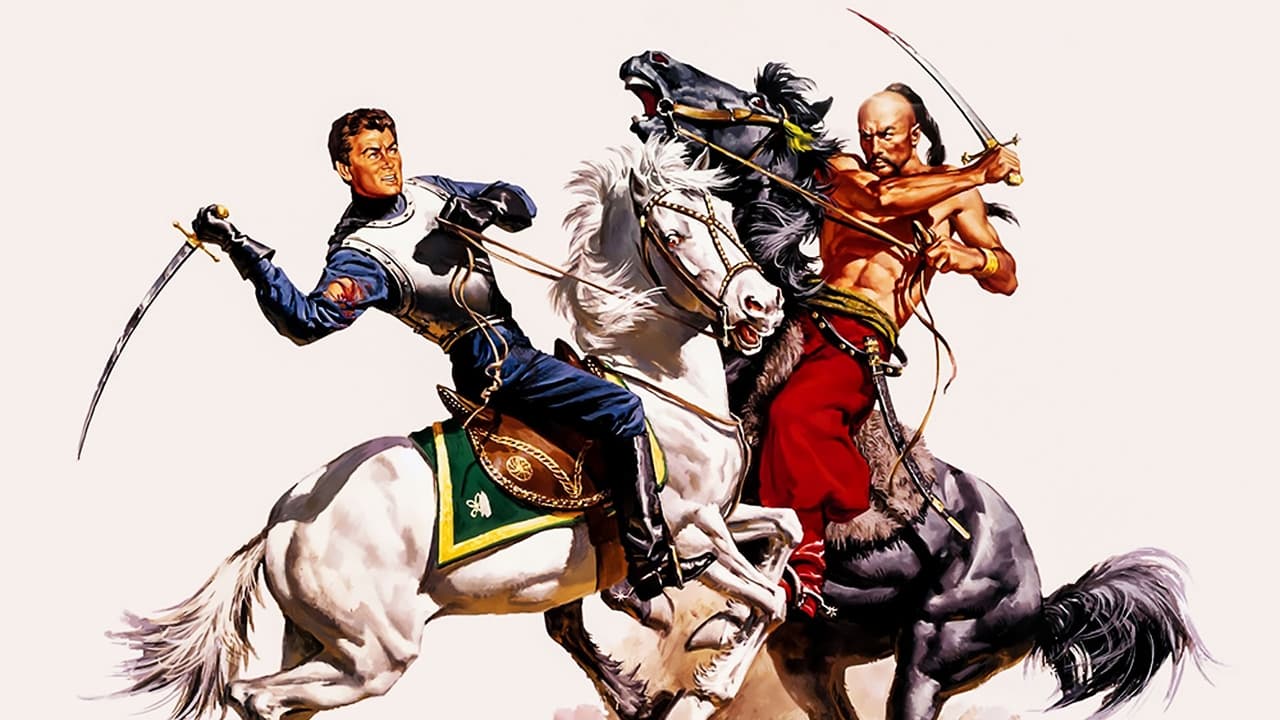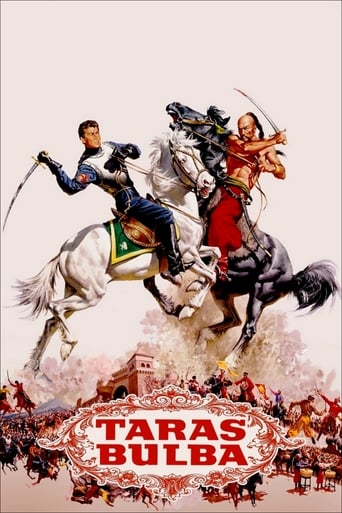Steinesongo
Too many fans seem to be blown away
Gary
The movie's not perfect, but it sticks the landing of its message. It was engaging - thrilling at times - and I personally thought it was a great time.
Skyler
Great movie. Not sure what people expected but I found it highly entertaining.
Haven Kaycee
It is encouraging that the film ends so strongly.Otherwise, it wouldn't have been a particularly memorable film
nekengren-2
This movie was quite interesting from the history angle and also had me in anticipation for several of the scenes.Best scenes: --The joining of Cossack brigades as they join forces to attack the Poles. Great cavalry spectacle in a great scenic setting. --The "dual" between Tony Curtis and the big Cossack where they both have to jump the gorge on horse until someone dies. --The Polish battle around the castle near the end.Predictable Script: --The Tony Curtis love angle with the Polish nobility woman.Unpredictable: The punch line between Tony and Yul. nuff said.
regalhistory
Taras Bulba, a loose version of the Gogol short story, is a strange film. I found myself asking what the political statement was? First Yul Brenner is wonderful as he chews his way through the dialog and scenery. He loves to throw his chest out and spout 'important' lines about freedom and freeishness. However, the film drops the anti-semitism of the original--Gogol blames it all on the Jews of course. Being made in 1962 just as the Cold War is getting going the theme seems a bit peculiar. The Cossacks are fighting for their freedom from the devilish Poles. At the time the film was made the real Polish people had suffered horrifying cruelty during WWII at the hands of the Cossacks and their Russian masters, and Poland was being absorbed into the Soviet sphere loosing their freedom for the next half century. Who do we root for, the Cossacks or the Poles? Ceriantly not those heathen commies!
Psalm 52
This film is not as impressive as some IMDb reviewers hint. It has overall poor production design and even worse set design. The Kiev sequence reeks of studio backlot and it shows. The matte drawings have a cartoon-like way of NOT helping set the era of the story. Waldo Salt's script is terrible. The casting of Brynner is brilliant, but then the casting of Curtis truly wrecks the film. The direction has a by-the-numbers feel to it that robs battle sequences of drama and the horses/soldiers going over the cliff is done w/ toy horses/soldiers KILLING any illusion of reality. Then again it was made in 1962, but still ... epics were an established genre and this is not an epic film. The Curtis/Kaufman love subplot is unbelievable. There's one scene near the end when Brynner and Curtis face off and it's a textbook example of serious acting (Brynner) and matinée idol posturing (Curtis). Skip this film if at all possible.
Jonathon Dabell
"Taras Bulba" is a film by the prolific J. Lee-Thompson, and comes directly after two of his most fondly remembered films – "The Guns Of Navarone" and "Cape Fear". Sadly, Thompson is not able to record his third critical hit in a row with "Taras Bulba". While the film has plenty of lively set pieces, stirring music by Franz Waxman, an enjoyable performance by Yul Brynner, and epic widescreen cinematography by Joe MacDonald, it falls short in a handful of other departments. There's a romantic subplot, written in a manner that makes it seem over-ripe and soppy. There's a lack of historical and geographical authenticity which is hard to overlook. And, apart from Brynner as the titular character, too many of the actors are guilty of over-exaggerated performances.The Ukrainian Cossacks, led by the talismanic Taras Bulba (Yul Brynner), fight a battle against Turk invaders. They are assisted in their fight by an army of Poles, led by Prince Grigory (Guy Rolfe). Grigory makes a deal with the Cossacks that if their joint forces win the battle, he will reward them by granting them control of the Steppes of Eastern Europe. But once the battle concludes with victory, the Poles go back on their word and betray their Cossack allies. The Cossacks retreat into the hills, where Taras Bulba contemplates how he will one day have his revenge upon the treacherous Poles. He eventually decides to send his two sons – Andrei (Tony Curtis) and Ostap (Perry Lopez) – to a Polish university, where it is intended that they learn all there is to know about the ways and customs of their enemy. The plan begins to fall apart when Andrei falls in love with Polish noblewoman Natalia Dubrov (Christine Kaufmann). Andrei is torn between his love for Natalia and his devotion to his own people's cause. Later, when his son's split loyalties become clear, Taras Bulba also finds himself torn between his love for his son and his need to lead the Cossacks against the Poles."Taras Bulba" is a film that sounds great when described, but the actual article doesn't quite live up to its potential. I've already made clear my feelings about the romantic subplot involving Andrei and Natalia, but the over-ripeness and soppiness that plague these scenes are only half of the problem. For the film to reach the devastating tragic climax it seems to be aiming for, Andrei and Natalia's relationship needs to be convincing. We need to feel for them; we need to be fully absorbed in their dilemma of loyalties; we need to be moved by the terrible ironies that bring the film to its supposedly sad conclusion. But we aren't. "Taras Bulba" is ten times more effective when concentrating on spectacular action and epic-scale battles. For these scenes alone it remains a film well worth watching. But it's those attempts to turn it into a tear-jerker – an epic for the soft-at-heart, if you like – that simply don't work, and pull the film significantly downwards.

